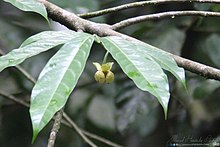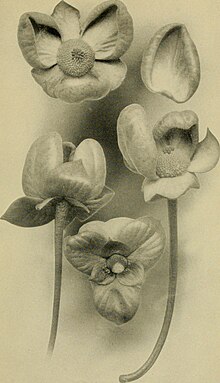Cymbopetalum penduliflorum is a species of plant in family Annonaceae. The specific epithet penduliflorum derives from the Latin pendulus (pendent or hanging)[2] and florum (flowered).[3][1]
| Cymbopetalum penduliflorum | |
|---|---|

| |
| leaves and a young flower of Cymbopetalum penduliflorum | |

| |
| Cymbopetalum penduliflorum flowers | |
| Scientific classification | |
| Kingdom: | Plantae |
| Clade: | Tracheophytes |
| Clade: | Angiosperms |
| Clade: | Magnoliids |
| Order: | Magnoliales |
| Family: | Annonaceae |
| Genus: | Cymbopetalum |
| Species: | C. penduliflorum
|
| Binomial name | |
| Cymbopetalum penduliflorum | |
| Synonyms | |
Description
editThe plant grows as a tree or small shrub[4] with distichous, subsessile, oblanceolate leaves. It has solitary flowers borne on long slender peduncles coming from the internodes of the smaller branches. Its sepals are broadly ovate or suborbicular, cuspidate, reflexed at length, The outer petals are similar, but are much larger than the sepals. The inner petals are thick and fleshy with an involute margin that causes them to resemble a human ear. When fresh, the pungent flowers are greenish-yellow with the inner surface of the inner petals tending towards orange, at length turning brownish-purple or maroon, breaking with a bright orange fracture.[5]
Distribution and habitat
editIt is native to mountainous areas of southern Mexico, Guatemala,[5][4] and El Salvador.[6] It is still cultivated as a spice in the Guatemalan regions around Cobán and Jacaltenango and sold in markets in those areas as well as Antigua Guatemala, Santa Ana, El Salvador, and San Andrés Tuxtla, Mexico.[7]
Uses
editThe dried flowers of C. penduliflorum and related species C. costaricense[8] were traditionally used to give a spicy flavor to chocolate[4] before the arrival of cinnamon and the other Old World spices.[5] The dried petals are still used to in atoles, pinoles, and coffee.[7]
In culture
editCommon names include sacred earflower.[5] In Spanish the plant is called flor de la oreja[4] or orejuela, and in Nahuatl it is called xochinacaztli. In the Guatemalan municipality of Todos Santos Cuchumatán it is called tzchiquin itz in the Mam language. It is called muc' by the Qʼeqchiʼ in the area of Cobán.[7]
References
edit- ^ a b Dunal, Michel-Félix (1817). Monographie de la famille des Anonacées (PDF) (in French). Paris ; Strasbourg ; Mointpellier: A Paris : chez Treuttel et Würtz, rue de Bourbon, n.º 17 ; A Londres : même Maison de Commerce, 30 soho-square ; A Strasbourg : même Maison de Commerce, rue des Serruriens, n.º 30 ; A Montpellier : chez Renaud, Libraire, à la Grand'rue. OCLC 6951716. Archived (PDF) from the original on 11 July 2019. Retrieved 11 July 2019.
- ^ Griffith, Chuck (2005). "Dictionary of Botanical Epithets". Dictionary of Botanical Epithets. Archived from the original on 25 June 2018. Retrieved 11 July 2019.
pendulus pendula pendulum pendulous pendulus pendul adj hanging, pendent
- ^ Griffith, Chuck (2005). "Dictionary of Botanical Epithets". Dictionary of Botanical Epithets. Archived from the original on 12 May 2019. Retrieved 11 July 2019.
florum flowered florus flor ppar floreo to bloom, to flower
- ^ a b c d Uphof, Johannes Cornelis Theodorus (1968) [1959]. Dictionary of Economic Plants (second ed.). New York, NY: J. Cramer. p. 167. ISBN 9783904144711. OCLC 48693661.
- ^ a b c d U. S. Department of Agriculture, Bureau of Plant Industry, ed. (May 1922). Inventory of Seeds and Plants Imported by the Office of Foreign Seed and Plant Introduction during the Period from April 1 to June 30, 1918 (PDF). Vol. 55. Washington, DC: Government Printing Office. pp. 5, 35–36. Archived from the original (PDF) on 21 December 2016. Retrieved 28 July 2015.
- ^ Roskov, Y.; Abucay, L.; Orrell, T.; Nicolson, D.; Kunze, T.; Culham, A.; Bailly, N.; Kirk, P.; Bourgoin, T.; DeWalt, R.E.; Decock, W.; De Wever, A., eds. (2015). "Species details : Cymbopetalum penduliflorum (Sessé & Moç. ex Dunal) Baill". Species 2000 & ITIS Catalogue of Life, 2015 Annual Checklist. Leiden, the Netherlands: Naturalis. Retrieved 28 July 2015.
- ^ a b c Murray, Nancy A. (6 December 1993). Revision of Cymbopetalum and Porcelia (Annonaceae). Systematic botany monographs. Vol. 40. Ann Arbor, Mich: American Society of Plant Taxonomists. ISBN 9780912861401. OCLC 29527548.
- ^ Seidemann, Johannes (27 December 2005). "C". World Spice Plants: Economic Usage, Botany, Taxonomy. Springer Science & Business Media. p. 129. ISBN 9783540279082. Archived from the original on 26 September 2022. Retrieved 2 July 2015.
Flavoring of drinking chocolate